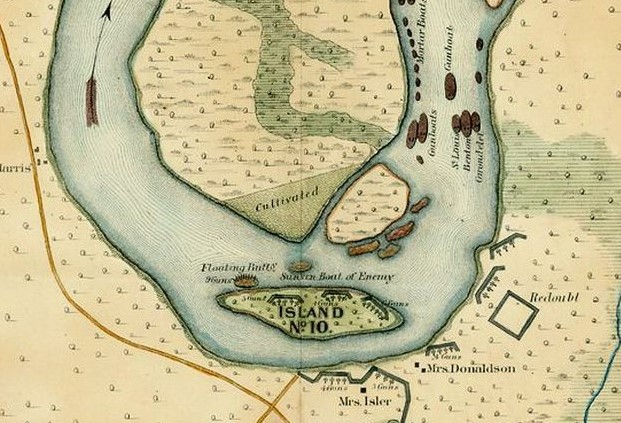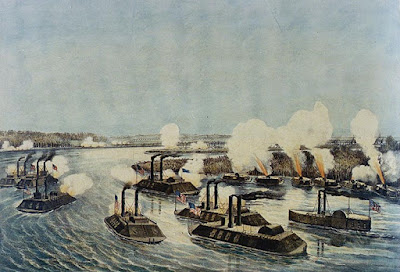Gloomy Final Days of Island No. 10
Captain John Randolph Farabee of the 4th Confederate Infantry [also known as the 1st Alabama, Mississippi, and Tennessee] wrote to his wife Carrie in Germantown, Tennessee that in the final days on Island No. 10 in April 1862, it seemed that God himself was against the Confederacy. “There is no chance of getting anything to eat and with duty enough for ten times our force and being shelled by the enemy’s gun and mortar boats night and day. If anyone of us ever escapes, it will be by the assistance of Divine Providence as they will not reinforce us and if not reinforced immediately, we will spend our summer at some Northern city. The enemy have been favored for the last two or three days by God’s own assistance: the darkness of night and the frequent storms,” he complained.”
Captain
Farabee’s letter never reached his intended recipient: Lieutenant Sanford F. Timmons
of Co. C of the 43rd Ohio picked up the letter on the island after
it surrendered on April 8, 1862. The letter was written to Captain Farabee’s
wife Carrie, whose full name was Elizabeth Carolyn Marshall Farabee. The Farabee’s
had two young boys at the time of his capture, 2-year-old James Marshall
Farabee and 1-year-old Walter Menifree Farabee. Lieutenant Timmons sent the
letter home to Cadiz, Ohio and it was published in the April 23, 1862, edition
of the Cadiz Democratic Sentinel.
Captain
Farabee also traveled to Ohio, but it was as a prisoner of war as he was
captured along with most of the Island No. 10 garrison. He arrived at Camp Chase in
Columbus, Ohio in mid-April, then was sent to Johnson’s Island, Ohio on
April 26, 1862. Captain Farabee was discharged from Johnson’s Island on
September 1, 1862, and was officially paroled for exchange at Vicksburg,
Mississippi on September 20, 1862. The actual exchange didn’t take place until
November 10, 1862, by which point Farabee was absent on recruiting duty.
In the meantime, the old 4th Confederate was broken up and Farabee’s company was assigned as Co. C of the reorganized 42nd Tennessee Infantry. Captain Farabee apparently returned home to Germantown, Tennessee where he was captured again on January 7, 1863, and shipped back North to Camp Chase. This not being known back at the regiment; he was dropped from the rolls of the 42nd Tennessee as absent without leave. Farabee moved to the Alton, Illinois prisoner of war camp then was transported to City Point, Virginia for exchange on April 1, 1863. On July 2, 1863, he was mustered as Captain of Co. D of the 16th Tennessee Cavalry, a new regiment being raised at Pikeville, Mississippi with recruits from Shelby County, Tennessee, his home county. Farabee apparently was reduced to the rank of private that fall and the 16th Tennessee became consolidated to form the 15th Tennessee Cavalry, which itself was reorganized the following summer. Farabee survived the war but died in 1867.
Island No. 10
April 7,
1862
My dear
wife,
I am still at Island Ten amid the booming
of cannon which has not ceased for three weeks today. Our duties are very
arduous as we have a very small force and have to be very vigilant on account
of the proximity of our lines. The Mississippi River is the Rubicon and they
have the means of crossing in the shape of gunboats, etc.
We have seen harder service than
anyone can imagine. There is no chance of getting anything to eat and with duty
enough for ten times our force and being shelled by the enemy’s gun and mortar
boats night and day. If anyone of us ever escapes, it will be by the assistance
of Divine Providence as they will not reinforce us and if not reinforced
immediately, we will spend our summer at some Northern city. The enemy have
been favored for the last two or three days by God’s own assistance: the
darkness of night and the frequent storms. We have lost one battery on the mainland
and the floating battery from several shots has thought best to retire leaving
our island considerably weakened.
The gunboats passed down stern
foremost with the lights on the bow so as to attract our fire to that portion
of the boat. The attack was terrific, made doubly so by heaven’s own artillery.
You must use your own discretion with
the advice of Colonel Maples as regards the Negroes, but I believe it would be
best to stop the sales, especially if you cannot get good prices and then the
money is no better than they are. If you have any money, transfer, and get the
State Bank of Tennessee. Get gold for some of it if it can be procured without
an awful sacrifice. You must tell Mr. Williams to pitch in and make a good corn
crop if he does not have to go, and if he does go, to get somebody in his
place.
Kiss the babies and give my love to
all at home and to Colonel Maples’ family; tell them to write.
John R.
Farabee
Captain,
C.S.A.
Sources:
Letter
from Captain John Randolph Farabee, Co. H, 4th Confederate Infantry,
Cadiz Democratic Sentinel (Ohio), April 23, 1862, pg. 3
Record of John R. Farabee, Complied
Service Records of Confederate Soldiers Who Served in Organizations from the
State of Tennessee, NARA












Comments
Post a Comment